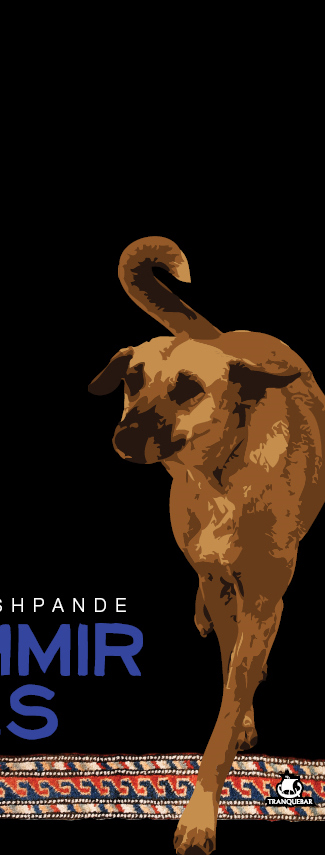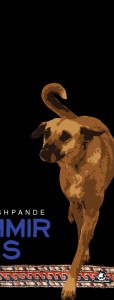http://simplyani.wordpress.com/2010/09/26/book-review-kashmir-blues/#comment-1810


http://www.curiousbookfans.co.uk/2010/creative/4271/urmilla-deshpande-talks-to-curious-book-fans
CBF: How did you suddenly decide on Kashmir as the main setting for this novel? Was it because of the current political crisis?
UD: I didn’t suddenly decide on “Kashmir” as the setting. This book was written in 2003-2004, not recently. I was interested in individuals who decide to stand against a power much greater than themselves, such as a government. I didn’t know much about it. The other thing I would like to say is that no matter how closely fiction is based on, or resembles reality or the real world, it is fiction. The Kashmir in my book is no more real, I think, than is the Alexandria in Durrell’s quartet or the London that Sherlock Holmes lives in.
CBF: The theme of wealth for protection is unusual. How did you happen to decide on that?
UD: Wealth, power, and distribution of resources is how the world works. Most rebellion takes place where there is an unequal or inequitable of resources. Anywhere in the world, the group with the most wealth has the most protection. I don’t know if it is an unusual theme for a novel – I don’t think it is – but it is certainly not an unusual theme in the scheme of things!
CBF: As most writers are asked, are any of the characters in Kashmir Blues based on people you know?
UD: Every character is based on people I know, or have read about, or have encountered in life, movies, even heard about. Most are composites of all these, and myself too. Leon is the one I identify with most. Naia, slightly aloof, impenetrable, a catalyst more than a doer, came out just right for me. Many readers complained that she was a “cold, unlikable protagonist” – but that’s how she is, cold and unlikable. And I don’t think the book has a single protagonist. But she represents many people I have known, and found hard to reach, or just plain disliked.
CBF: What inspires you most when you start to write? Is it a person, a newsflash? What?
UD: Hard to answer this question. I think all through life we watch and absorb and think and react – and all of that comes into a book as it gets written. Usually I start a book because of a feeling I have. I’ve written just two, and the starting points for both were quite different. The first – Kashmir Blues – I just wanted to tell a story. The second, A Pack of Lies, had a lot of my own experiences as a starting point. The nextbook I’m working on is almost a challenge from my editor – she wanted me to edit an anthology of erotic short stories – and I said, after hearing what editing meant, “seems easier to write it myself” – and she said I should! I have just finished editing a book of anecdotes from the students of IIT Bombay about their life there in the ’80s – and am starting on the short stories. It’s not easy… but I am enjoying the work. And, I have to deliver the manuscript by the 30th of November.
CBF: Who are your favourite authors?
UD: The list is long, I’ll make it short – Jane Austen, Kurt Vonnegut, Borges, Marquez, Jane Austen, Steinbeck, Asimov, Lawrence Durrell, and – did I mention – Jane Austen!
“Everyone knows a Kashmiri shawl wala or carpet seller – they arrive with the coming of autumn carrying treasures of colour in their autumn leaf brown bundles. And then they disappear with spring for months on end and you occasionally, reading about disturbances in the Valley, you wonder whether they will reappear. At the heart of Urmila Deshpande’s novel is Samaad, a carpet seller who speaks the Queen’s English because he happened to have been educated in England. He is a man with a mission – he has discovered a mineful of priceless Kashimiri sapphires, the Kashmir Blues of the titles and he wants to use the sapphires to ensure peace for the part of the Valley in which he lives….“
Read the review at
http://www.curiousbookfans.co.uk/2010/fiction-books/4164/kashmir-blues-urmila-deshpande
| Lead review | |
| Cinematic imagery | |
| Monideepa Sahu | |
| Urmilla Deshpande’s ‘Kashmir Blues’ is a story written with deep compassion and even the darkest characters are humane, says Monideepa Sahu | |
 Kashmir Blues takes in its expansive narrative sweep the characters’ lives from southern California to the seedy streets of Mumbai, to the charmed circles of India’s rich and powerful, and to Kashmir, strife-torn vale of guns and flowers. Insurgency, socio-political unrest, smuggling, drugs, espionage and conflict cast their shadows. Yet this is a story told with deep compassion. Even the most potentially evil characters can startle by revealing positive human and humane facets. As the author says, “I don’t think either sapphires in my book or diamonds in West Africa are the basis of strife. Nor is religious fundamentalism. It is the inequitable distribution of resources, structural poverty, that sends people into conflict and civil war. Institutionalised injustice.” Kashmir Blues takes in its expansive narrative sweep the characters’ lives from southern California to the seedy streets of Mumbai, to the charmed circles of India’s rich and powerful, and to Kashmir, strife-torn vale of guns and flowers. Insurgency, socio-political unrest, smuggling, drugs, espionage and conflict cast their shadows. Yet this is a story told with deep compassion. Even the most potentially evil characters can startle by revealing positive human and humane facets. As the author says, “I don’t think either sapphires in my book or diamonds in West Africa are the basis of strife. Nor is religious fundamentalism. It is the inequitable distribution of resources, structural poverty, that sends people into conflict and civil war. Institutionalised injustice.”
Author Urmilla Deshpande began writing relatively later in life, though she always wrote and told stories. “Living in America without a work permit, between doing laundry, cooking, dishes, driving kids around, my mind wandered into strange territories. Writing may have been an escape from the intense grief of my mother’s death, and slow acceptance of her non-existence. Kashmir Blues is an escape, totally unrelated to my own life. It distracted me, yet gave me purpose.” While there is no direct connection between the author’s life and the book, she chose to write about Kashmir and the divide caused by growing religious fundamentalism. “Maybe it wasn’t flashes of inspiration, “she explains,” but observation, experience, memory, everything I see and read and hear that is fodder for stories. I have to suppress fear of disapproval and consideration for peoples’ feelings and just write. I have been a photographer, but not like Leon, and I have smoked ganja on occasion but didn’t have a drug dependency, I was not adopted or stolen nor did I lose my parents, or child. And, I have never been to Kashmir. It’s a made-up story. Maybe living in post 9/11 America, or editing a book on civil wars had something to do with it, but these are all fragments of what’s around. I guess I just steal from everything.” The unique Kashmir blue sapphires, the legendary tears of Shiva; the beautiful Kashmiri carpet symbolic of the land and its unravelling with growing strife; the ubiquitous brown dog which seems to follow Leon everywhere; the importance of taking, or breaking free from the spell of drugs; myriad enduring images bind Kashmir Blues. Urmilla Deshpande’s writing displays a cinematic quality. “While writing I feel as if I follow the action,” she says, “in the minds of characters and what happens around them. Like watching a movie and taking notes. I’m not saying it is mystical and ‘comes to me’. More, it’s free association of memories and experiences coalescing into a narrative. I find it hard to go back and say why something happened a particular way. I had to make the changes and address flaws my lovely editor pointed out, but I go back reluctantly. Because then I start reading it as a reader, and inconsistencies and doubts pop up.” The ‘tears of Shiva’ is made up from stories Urmilla’s mother-in-law told of sapphires bringing bad luck. While the author herself isn’t into religion, superstition, or jewels in real life, she found these ideas interesting. “As for the brown dog, he’s always around, isn’t he?” Urmilla quips with a mischievous twinkle in her eyes. Naia and her deep bond with Leon, the photographer with the urge to self-destruct; Samaad the well-educated and far-sighted carpet dealer and warlord in the making; Frank the addicted German wanderer; Viren the diplomat; Saroj who mourns the public loss of her daughter and the private loss of sexual fulfilment; the main players in the story are clearly and credibly portrayed. However, there is an odd note in the rather filmi melodramatic way in which Naia is adopted. “This incident was one of the major changes I made in the editing process” Urmilla says.“I would have loved to leave it vague with not much explanation. But that might have led to different questions about inconsistency! It’s hard to write for everyone, and I don’t do that. I have to be clear myself. I love that you find it filmi—maybe someone will make this into a filmi film—starring Jeremy Piven as Leon (It has to be Jeremy Piven). Writing is a delight and a pleasure in itself. But it’s short lived. After that, my fulfilment comes from readers’ interpretations. People bring themselves to the books they read—and I am always surprised by what they come up with.” As for the ideas and inspirations behind the characters, Urmilla shares how her mother once said that characters write themselves. “I thought her a bit mad, but find (as we do about our parents) that she was right. Once characters come to life, it’s hard to make them act in inconsistent ways without putting them in situations where they would break character, or reveal some unseen part of themselves.” Once Urmilla began to write Anne, her depression, her infertility, her fascination with babies and her distress over the street children in Bombay all led up to that moment when she did what she did. One of her favourite people in the book is Saroj. “I felt her, heard her voice more than any other. Odd, because I have almost nothing in common with her. I am unable to explain where these people come from or why they do what they do. It is a fast process for me, the actual writing of a novel, but I think life and experience should be counted as part of the process. In which case I would have to say, I’ve been preparing every day of my life to be a writer, and when I was ready, I wrote!” |
|

Saint George Island
So, even though I am not writing at the moment, I assure myself that I am collecting material. Looking, seeing, smelling, tasting, eating, listening – it’s all data collection. It will, I tell myself, churn about, or maybe just sit there and ripen, and surely and quickly turn into a clever, or dour, or exciting, or, most hopefully, erotic stream of words that will get me to my deadline. Working/not working – toward a collection of erotic short stories. Erratic.
Kashmir Blues and A Pack of Lies are sitting on Amazon’s shelves collecting cyber dust. I write because I want to. But I do now wish for my writing to be read. I would give it away free, but then, in this world it would be judged as worthless. Also, potatoes and health insurance don’t come free, or art and literature would be too. I’d write for my own delight, and then for the thanks and praise after (abuse would be fine too, it would mean the abuser read my writing). And I’d eat potatoes and be well.
There’s no oil on the beach where I was working last week. They said it was a hundred miles to the west of us, and probably wouldn’t make it there. Trucks and booms lay ready and waiting though, just in case. I collected a lot of sand and salt wind and serenity. Monday morning, there will be words.
When I received the pdfs from Westland/Tranquebar for Amazon uploads, the acknowledgements page was missing. This page is, of course, in the printed version of the book, but not in the digital format.
ACKNOWLEDGEMENTS:
Without the dedicated reading of the first draft by my brother-in-law Paul Mitchell, and the detailed reading of the last by my editor Prita Maitra, and her (gentle) insistence on getting it right and not letting me get away with vagueness or laziness, this book would not be what it is. My heartfelt thanks and love to you both.
My sister Meithili Mitchell was part-time editor as well, not always voluntarily, and sometimes even under (vague and unspecified) threats. My love and thanks to you.
Nikhil Khosla, my friend who happens to be my brother-in-law, thanks for sharing your knowledge.
Thank you Lu Vickers, for all your help. Your comments and suggestions were invaluable, and I know the book is better because of them.
My friends who gave me valuable criticism and welcome praise. You make my writing better, yes, but also me: Urvashi Khosla, Richard Bush, Sheila Curran, Joseph Hellweg, Jane Macpherson, Julia and Philip Sura, Robert Draper (who also took out the garbage and changed lightbulbs), Tracy Sumner, Shashi Deshpande, Suhael Merchant.
Sukhi, Tissa, Ashish, and Saheli, your patience and tolerance sustains me, and your encouragement and expectations make me reach beyond my own perceived limits. In writing and in life.
Frank-Udo, I used your name without your permission. This Frank is named for you and not any other. But there the resemblance ends. I did not know you were in the world when I wrote it, just hoped that you were.
Kashmir Blues, my second book, is available in India. This one’s for you, all you guys who will read it. I hope you enjoy it, and I hope some of you will share your thoughts with me. Because though writing is a pleasure and delight all its own, the feeling I get when you tell me what you got from the book, and what you didn’t, and what you liked and what incensed you, and which people you hated, identified with, fell in love with – all this means you read it.
You are currently browsing the archives for the Kashmir Blues category.